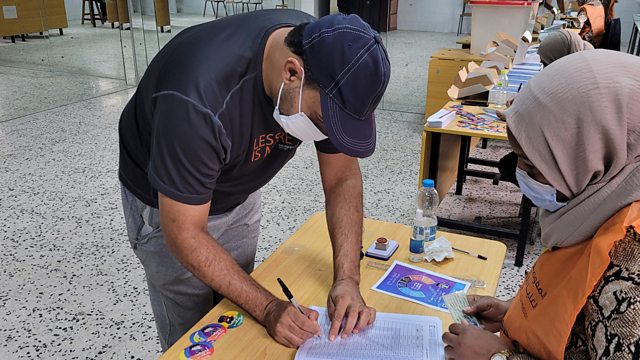Libya's anxiously-awaited elections
On Tripoli's streets, Libyans wonder about the votes planned for December; wars of words in Bosnia; Turkish attitudes to migrants harden; the social value of Brazil's snack bars
Screeching tyres and the smell of burning rubber: the amateur stunt shows on Tripoli’s streets at night - and the tense atmosphere ahead of elections which could be make or break for Libya. The vote has been hard enough to arrange; it’s the fruit of a long-drawn-out UN-backed peace process. It's been beset by wrangles over who should be allowed to run, the voting schedule and what powers a president should have. Orla Guerin talks to Libyan citizens, analysts and foreign diplomats about their hopes for the presidential and parliamentary elections, which are meant to be held on December the 24th this year.
In the 1990s, Bosnia and Herzegovina saw the worst conflict in Europe since the Second World War. It was a battle for territory, and it only ended when a compromise was reached: that Bosnia would remain one single country, but with two regions. But now, certain aspects of the Dayton Agreement are beginning to look rather frayed. Some local politicians are voicing hard nationalist sentiments in public again - and Guy De Launey reports that's stirred real fear for some in Sarajevo and elswhere.
While 'migrant crises' in the Mediterranean or on the Belarus/Poland border receive a good deal of media coverage, on a global level, it's actually nations outside the EU which host the most outsiders. Whether it’s the Venezuelan exodus fanning out across Latin America, the number of refugees in Uganda or the huge Afghan population in Pakistan, or the Iraqis and Syrians in Jordan, the numbers of displaced and disposessed people they take in are far larger. According the UNHCR, Turkey is top of the global list of host nations, with more than 4 million refugees living there. That used to be a matter of official (and popular pride - but recently Ayla Jean Yackley has felt a change in the mood.
And what do you really see as an “essential service”? In Brazil, the country's indispensable lanchonetes - neighbourhood snack bars - are not just social hubs but lifelines for some. During the pandemic, many were allowed to stay trading in the teeth of local lockdown measure. Andrew Downie explores the cultural history of these no-nonsense spots for eating and drinking - and he's very much a fan, particularly of the hearty, carb-heavy fixed lunch known as the PF.
(Image: Libyan man registers to vote in a polling station in Tripoli, November 2021. Credit: Mahmud Turkia/AFP)
Last on
More episodes
Previous
Next
Broadcasts
- Sat 20 Nov 2021 16:06GMT���˿��� World Service News Internet
- Sun 21 Nov 2021 04:06GMT���˿��� World Service
- Sun 21 Nov 2021 09:06GMT���˿��� World Service
- Mon 22 Nov 2021 00:06GMT���˿��� World Service

